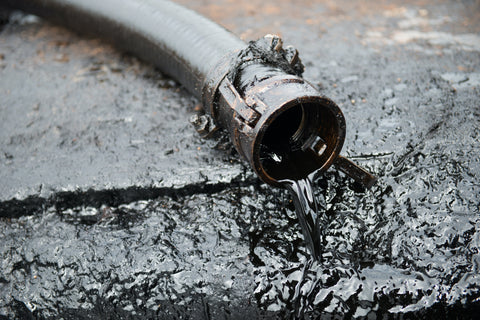Does Berkey Remove Petroleum Products?
Yes, Berkey Filters addresses >99.9% of petroleum products, like gasoline, diesel, and other motor oils.
Yes, Berkey Filters filter volatile organic compounds (VOCs) to below detectable limits in independent lab tests.
See the test results

What are Petroleum Products?
Petroleum encompasses the liquid, gas and solid found in the Earth's crust. It's a complex mixture of hydrocarbons, and most often a yellow-brown liquid. The elementary description is rock oil. It is also referred to as called fossil fuel because it's made from thousands of years of fossils (and other matter) compressed into the soil. The fuel portion of the terms derives from the use, majority of its use is for fuel.
Petroleum products are made from crude oil which is a mixture of hydrocarbons and diatoms. The most commonly known products are gasoline, diesel, motor oil, kerosene, mineral spirits and refined oil. This is a nonrenewable resources because it takes thousands and thousands of years for carbon forms to decompose enough in the earth's layers to result in oil.
Health Concerns Associated with Petroleum Products
Petroleum products are so widely used that almost everyone is exposed to them somehow. Exposure can happen from burning, spilling, or leaking which in turn is inhaled, ingested, or absorbed. For example, when there is an oil spill, even after a clean up, residue can still be in the water and soil.
The symptoms of a negative reaction from petroleum exposure can be; skin irritation, eye irritation, dizziness, headache, nausea, or possibly death (extreme cases only).
Petroleum-Based Compounds
In particular, prolonged exposure to benzene, toluene, xylenes, or polycyclic aromatic hydrocarbons can cause many different health issues.
These are also known as, volatile organic compounds. VOCs can have serious negative health effects, such as nervous system toxicity. Chronic exposure to VOCs can impair the immune system, worsening other health issues.
Benzene is a known carcinogen and to cause problems in the hematopoietic system, such as aplastic anemia (bone marrow failure). The hematopoietic system is the system of organs and tissues, including the bone marrow, spleen, thymus and lymph nodes, involved in the production of cellular blood components.
Polycyclic aromatic hydrocarbons (PAHs) are linked to low birth weights and delayed development in babies.
How Does Petroleum Get in Your Drinking Water?
In a 2003 publication, the National Research Council of the National Academy of Sciences reported that roughly 343,200,000 gallons of oil were released into the sea annually, worldwide. There's a few different ways that oil ends up in drinking water sources, the biggest being seepage.
Seepage is the slow release of liquid or gas through a small opening or crack. Oil and gas can seep into the ground from broken pipes, spills, or in the process of extracting. 43% of seepage is from natural cracks or vents in the earth's surface, most often on the ocean floor. Accidental spills and operational discharge make up 49% and the remaining 3% is from extraction. This spilled oil ends up in the water cycle which has a ripple effect (pun intended) on everyday products.

How to Remove Petroleum Products From the Water You Drink
Berkey Filters uses activated carbon filters, where the filter elements are made of coconut shells and charcoal. These filters have tiny pores that use their adsorption and absorption properties to filter out organic contaminants. They are also good at removing contaminants that have odd odors or taste, including chlorine, but keeping in essential minerals like iron.
The micropores in the filters are just one part of the filtration process. The Black Berkey Filters are charged for an ion exchange process. Molecules are extracted from the water where they are attracted to and transformed by electrically bonding to the media. The force of gravity pulls the water down and through the filters.
Another option for removing toxins is reverse osmosis. It takes the water and exerts it through a semi-permeable membrane, resulting in clean water. The downside to this method is the stripping of beneficial minerals from drinking water. This method works fine unless you want to keep essential minerals in your water. Reverse osmosis removes the bad, but also the good, without a well-balanced diet or mineral supplements could cause a mineral deficiency.
Trust Berkey Filters to address unwanted substances, including motor oil. Find the right Berkey Water Filter system size to fit your needs.
What Other Contaminants Does Berkey Filter?
The list is extensive! Rest assured that that water your family is drinking clean.
Does Berkey Change the pH of Water?
Is your water acidic? basic? neutral? What's good for consumption and how does Berkey affect it?
